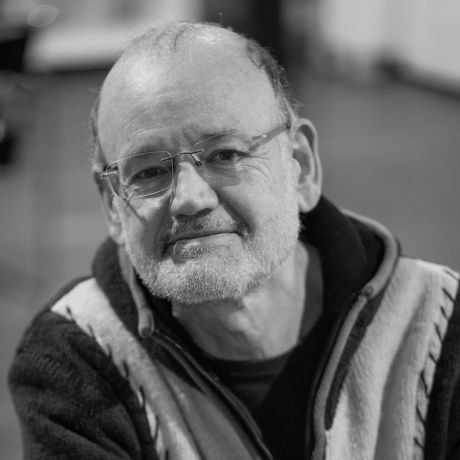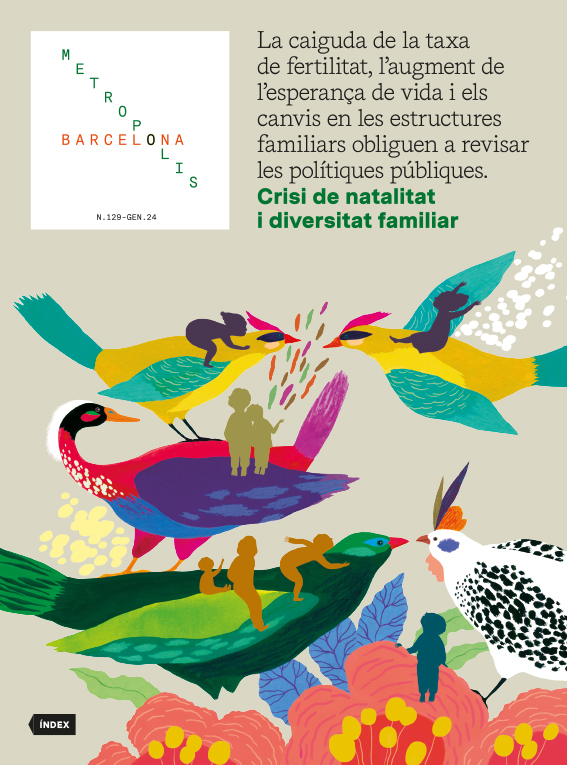The void in Barcelona
- The Story
- Jan 24
- 7 mins
Barely a year had passed since the Olympic Games and finding a job was already tough. I was discussing the matter with the girl behind me in the queue at the depressing Employment Service office in the Gothic quarter. She was about thirty-five years old. Physically attractive. Dark-haired, with big, light-coloured eyes.
She was wearing a tight black mini-skirt and a man’s white shirt with the sleeves rolled up and two or three buttons undone, just enough to reveal a hint of the top of her breasts. The queue was long, and our comments were short. We talked about anything and everything. And we looked at each other. We weighed each other up. I could also sense what she had seen in me: a man her age, tallish, with long hair and big hands, who’d probably once been good-looking, but was now slipping down the slope with no prospect of dodging a fall.
In any case, the unemployment line is a line of losers. And it’s hard to forget that.
We introduced ourselves. Her name was Magda. She told me that she’d worked in a book distribution company and that she’d been looking for work for six months. She wanted me to tell her something about my life. I played hard to get. I would either explain it well or not at all. Magda surveyed me when she thought I didn’t notice. She ran her tongue over her lips. We carried on talking about this and that. Conversations amongst the unemployed. Ideal for a spring day at five in the afternoon. We did our business and headed out onto the street.
“What do you know about the world of make-up?”, she asked.
She took me by surprise.
“Not a thing.”
“Will you come with me to Beauty Opportunity? It’s in Zona Franca. I’ve got a car.”
“What is it?”
“A make-up contest. Once a year, the macro-store Màximum organises it. I’ve signed up. The winner takes home a pack of expensive make-up products.”
I agreed to accompany her. Among other reasons, because I had nothing better to do, and Magda, every time she ran her tongue over her lips, it was as if she grabbed me by the balls and pulled me towards her.
We walked away from the employment office. We made our way to a rather old red Seat 127. Once inside, she opened the glove compartment and took out a bottle of DYC whisky. She unscrewed the cap and took a big gulp. She handed it to me and I took a swig too.
In a matter of minutes, Magda was in the Zona Franca, scorched earth, conquered land, where nobody wants to go, either to work or to do anything. But sometimes you have to go.
“Let’s go to D Street, between 4th and 5th”, she announced.
We left a sort of warren of cylindrical and gigantic fuel tanks, lined up side by side. We passed the huge forecourt of the TIR terminal crowded with giant trucks with names and colours as suggestive as Willy Hetz (yellow), Mazinter (white), Kolumbus (white and blue), Transflash (grey), Intertraffic (blue and yellow), Haniel Spedition (silver) and Framptons (pumpkin orange). I saw a crane. I thought it would pick us up and put us on a container ship to an unknown destination.
There were quite a few vehicles parked in the Màximum car park. Lots of girls with bags, suitcases or make-up cases were queuing up in a disciplined queue at the door, restless. Magda joined them.
I looked at her as she came in: she was pretty. She was unemployed. And she needed to enter an outlandish contest.
I walked through the car park. I sat on the ground, in the shade, leaning against a giant truck wheel. I took a few more swigs of DYC whisky. To the left I could see one of the side doors to the warehouse. Not a soul in sight. To the right, not far away, one of the car park entrances and the street. There’s nothing worse than the Zona Franca. For a moment it seems endless. And then your heart sinks.
There’s nothing worse than the Zona Franca. For a moment it seems endless. And then your heart sinks.
I thought of Magda and stood up. I headed towards the entrance to Màximum. The space set up for the contest was quite scary: a hall with roughly fifty tables with tabletop vanity mirrors forming ten rows of five. Companions (fathers, mothers, girlfriends, boyfriends, and so on), in a separate space, sitting on uncomfortable folding chairs, looked on, bored. The girls, on the other hand, were concentrating as if they were being examined. I spotted Magda. I approached her without anyone stopping me. She saw me and shouted:
“Come help me!”
“What, I don’t know anything about make-up.”
“I’ve lost a contact lens! When I took it out, it fell on the floor. Please look for it!”
She was on edge. She was wearing horrible horn-rimmed glasses. It was obvious that she never wore them. I looked under the table. The floor was dark and dirty. I smelled my own DYC whisky breath and the whiff of make-up. I began to stagger ridiculously on all fours.
We didn’t find the lens.
She collapsed like a rag doll and sighed:
“That’s enough.”
She took off her make-up with make-up remover and then smeared cold cream on her face. After cleansing her face, she put on her glasses, put her things in the make-up case anyway and turned to me, saying:
“Let’s get out of here.”
Magda’s voice of disappointment came from a much deeper place than this stupid make-up competition. And that missing contact lens was much more than just a contact lens.
Once outside, Magda tossed the make-up case in a bin.
“Screw that…”, she mumbled.
We got into the car. I asked her where we were going. She said she didn’t know. No problem, it was a destination I was quite familiar with.
It was a three-minute journey. She stopped in front of a hotel on K street, near Mercabarna. Three stars. Magda parked deftly between two lorries. We got out of the car. She told me we were staying the night. Right here, in the Zona Franca.
“Don’t worry, it’s my treat”, she said.
She took two single rooms. The clientele were people from Mercabarna, from the airport, and also some discreet prostitutes.
Clutching the room keys in our hands, we sat at the bar. I didn’t ask any questions. I didn’t want to know why a girl like Magda had taken me to a hotel. She didn’t tell me anything else either. We drank a bottle of chilled white wine and nibbled on crisps. We drank in silence. Maybe because we both had too many things to think about. When we finished the bottle, she suddenly told me she was going up to the room. We didn’t even kiss. Or anything.
I was alone in the room. Outside, a trailer transporting a giant piece of bridge or a huge column of reinforced concrete passed in front of the hotel at ten kilometres an hour. A UFO in the middle of a spring sunset.
It was still really early. I leafed through an old magazine. There was a report on the final of the 1985 World Chess Championship. Kasparov versus Karpov. This is the good thing about travelling (even if it is to the Zona Franca), I thought. You end up browsing through a magazine that you’d never flick through at home.
Five minutes later I went up to the bedroom. I lay down on the bed without getting undressed. I could hear the whirring of the vending machine in the corridor.
There was a knock on the door.
After we’d made love, we entertained ourselves by watching TV. A very flashy presenter was interviewing an experienced singer-songwriter turned ranchera singer who kept using the most blatant innuendoes. And I liked it because we were naked and we made loads of ironic comments about the situation. Meanwhile, the girl leaned on my right shoulder to peer outside through the open window: we saw a man standing in the street, waiting. Stopping in the Zona Franca is like stopping in the middle of a motorway. Worse still: you don’t even have the hope that there is an SOS phone nearby. You feel insignificant, you feel small. The desolation of the surroundings rubs off on you.
We finished the bottle of DYC whisky.
“Shall we go out for dinner?”
“Yes.”
“There are times when we need someone by our side”, Magda said as she smiled. And she clung tighter to me.
DYC whisky worked these miracles. I don’t understand why connoisseurs despise it so much.
I smiled back at her, because the whole thing was genuinely strange. And because it should be a no-no for unemployed people like us, instead of job hunting, to squander our unemployment benefit this way.
So utterly wasteful.
Recommended publications
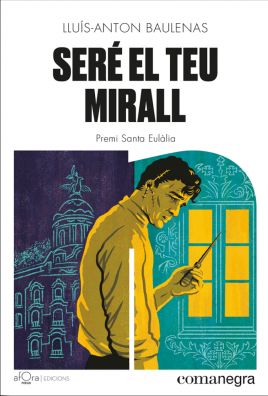 Seré el teu mirallComanegra, 2023
Seré el teu mirallComanegra, 2023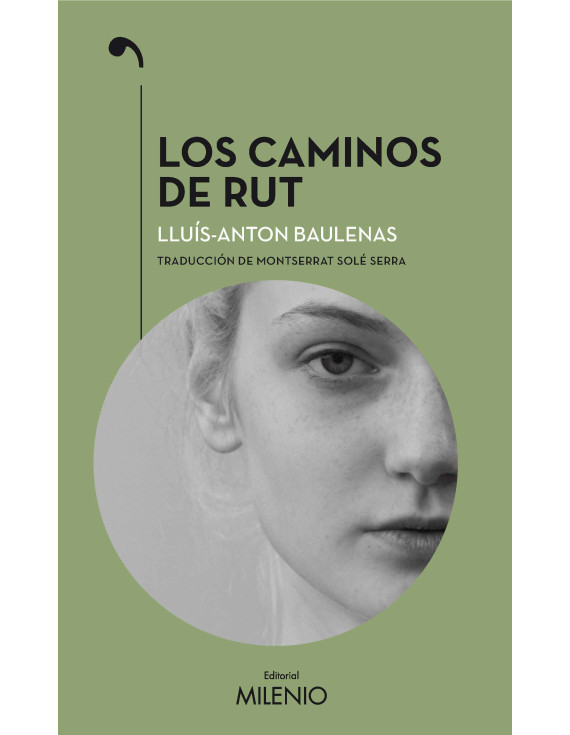 Els camins de la RutProa, 2019
Els camins de la RutProa, 2019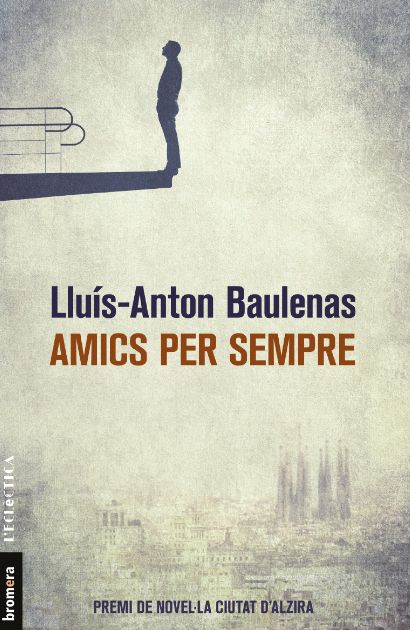 Amics per sempreEdicions Bromera, 2017
Amics per sempreEdicions Bromera, 2017
The newsletter
Subscribe to our newsletter to keep up to date with Barcelona Metròpolis' new developments



